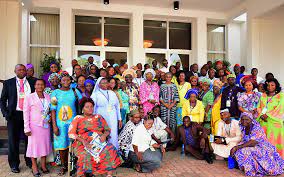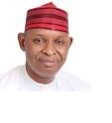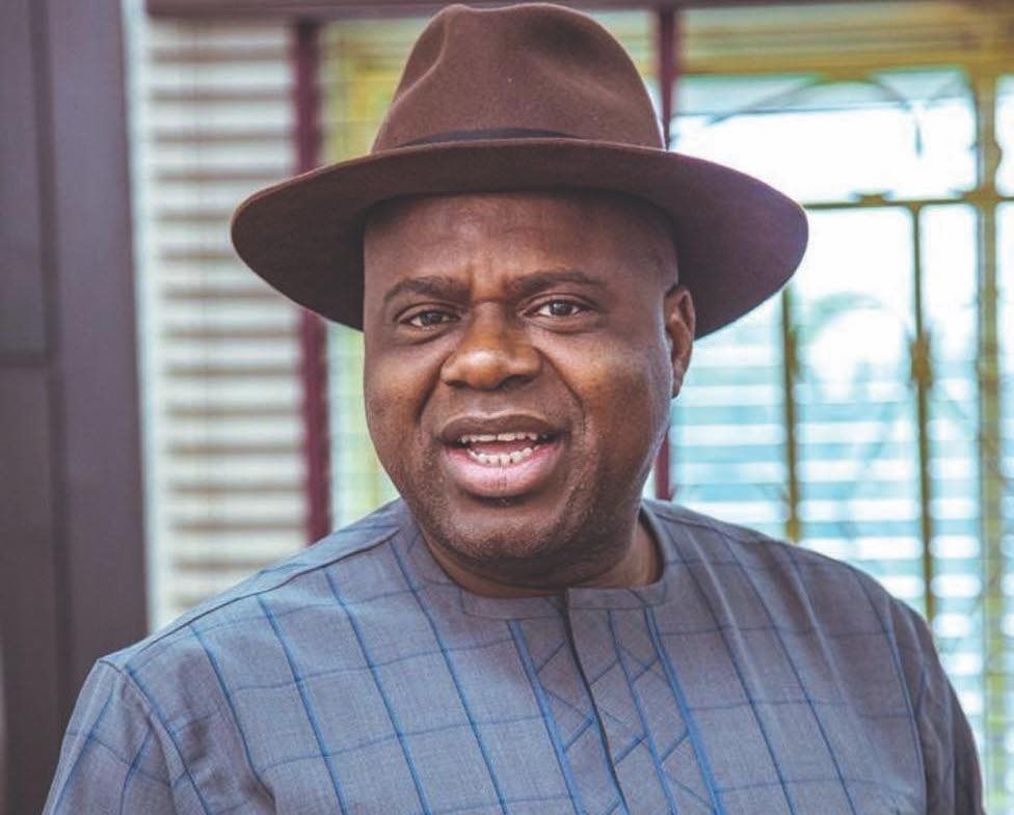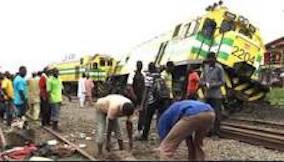Health
Kano Loses 80 Sick Cell Patients to Blood Shortage
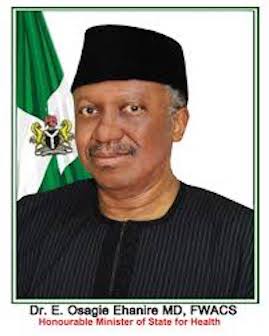
Secretary, Kano Sickle Cell Club, Mr Abdulkadir Muhammad has said no fewer than 80 of their members died in 2019 as a result of shortage of blood caused by economic hardship.
The scribe, who revealed this to newsmen in Kano, attributed the death of the members to shortage of blood due to their inability to buy prescribed drugs because of lack of funds.
According to him, the economic challenges had made it difficult for most of the patients to afford constant medical services.
“Most of our members have to borrow money for transportation to the hospital, thereby relying on the executive members to give them transport money back to their destinations.
“And we have no enough resources to cater for them, therefore we always find ourselves in one difficulty or the other,” he said.
Muhammad further revealed that after seeing doctors, most of the patients could not buy the drugs prescribed for them, which according to him, worsens their health conditions.
He also noted that shortage of blood is the greatest problem to sickle cell patients which results to death and other complications.
“Due to shortage of blood, we have lost about 80 of our members. Most of them died because they cannot afford to take care of their hospital bills.
“Their parents had no money to take them to hospital which make their body condition deteriorate rapidly.
“By the time the parents managed to bring them to hospital the condition has already worsen and before you know it, they lost their lives,” he explained.
“Blood shortage is our serious challenge, occasioned by lack of money,” he emphasised.
Muhammad added that the association had limited resources to buy blood and drugs for their members, calling on the government and general public to assist.
“We therefore call on the government to support us. Not only government, we also call on the general public to assist us, especially with blood and other drugs,” he appealed.
The secretary also expressed sadness over the challenges of members in buying prescribed drugs, as most of their drugs are used by drug addicts, making it difficult for pharmacies to accept to sell it to them.
Reacting to the development, the Director Medical Services, Kano State Ministry of Health, Dr Shehu Abdullahi, said the state government had designated clinics for sickle cell patients.
According to him, the state government also sponsor the training of specialised consultants on sickle cell disease in a bid to provide medical care for sickle cell patients.
He added that the consultants had already been posted to various hospitals across the state to take care of the patients.
“The state government, through the Ministry of Health, has also dedicated budget to procure medicines, consumables and finance the activities of the sickle cell patients.
”Also, N50 million has been budgeted for blood transfusion services for the sickle cell patients and even people suffering from other ailments.
“This is in addition to resuscitation of blood banks in our hospitals.
“Government is doing a lot on sickle cell disease because we know it is a financial, emotional and moral burden on the patients and their parents,” the director said. (NAN)
Health
Ebonyi Records 28 Cholera Deaths, 386 Cases
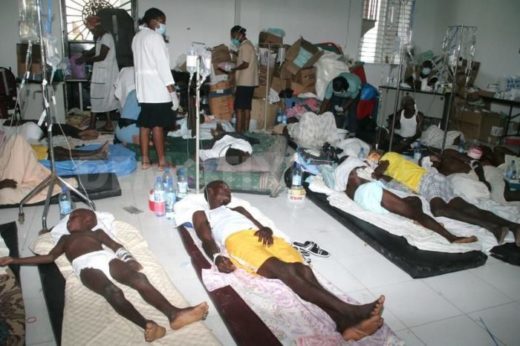
The Commissioner for Health, Dr Moses Ekuma, has disclosed that the state has recorded 28 deaths and 386 cases since the cholera outbreak on September 24.
Ekuma made this known to newsmen on Saturday during the donation of medical commodities by the Governor’s wife, Mrs Mary-Maudline Nwifuru, to the General Hospital in Iboko, Izzi Local Government Area.
Ekuma said most deaths occurred at home before the emergency response team and the ministry were informed.
He attributed cholera outbreaks to contaminated water, poor sanitation, and improper disposal of refuse, among other factors.
To tackle the outbreak, he said about six treatment centres have been designated across the state.
He said the governor’s wife’s donation, made through her pet project, Better Health for Rural Women, Children and Internally Displaced Foundation (BERWO), included home purification tablets, hand sanitisers, intravenous infusion, and oral rehydration salt.
Ekuma commended the governor’s efforts against the epidemic.
Mrs Nwifuru, while making the donation, commiserated with families of the victims and encouraged them not to lose hope.
She noted that the visit aimed to identify factors contributing to the spread of the disease.
“The sight of these people battling cholera is a reminder that we must do more to protect our communities from infectious diseases,” she said.
Daniel Hernandis, Project Medical Referral of Doctors-without-Borders, decried the outbreak’s level, stating that over half of the cases were recorded in Izzi Local Government Area.
Hernandis appreciated the support from the World Health Organisation and healthcare workers on the frontlines.(NAN)
Health
Only 17% of SDG Healthcare Targets are on Track – WHO

By Laide Akinboade, Abuja
World Health Organization (WHO) Country Representative to Nigeria, Dr. Walter Kazadi Mulombo, at the weekend revealed that only 17% of the Sustainable Development Goals, SDG, healthcare targets are on track, while the rest are at serious risk.
Mulombo stated this in Abuja, while addressing journalists at the two-day capacity training organised by WHO.
He said it is imperative for the Federal Government, FG, to accelerate its healthcare reform in order to meet the SDGs.
Dr. Mulombo stressed that Nigeria must move beyond pilot projects and focus on delivering large-scale, quality healthcare solutions.
He added that the key word is ‘acceleeation’ “If we continue in the pace at which we are going,been might not reach there.
There might be prospects of extension but we should not look at that . We are therefore urging Nigeria to accelerate”.According to WHO boss, “It’s time for implementation, quality, scale, and speed,” he said, urging for collective efforts from the government and communities to overcome challenges.
Dr. Mulombo said it is very worrisome that Nigeria rank 187th out of 191 countries in healthcare performance. He pointed to factors such as inadequate funding, poorly trained healthcare personnel, and high costs of services as barriers that need immediate attention.
Journalists, he said, have a pivotal role in driving change by ensuring that the public receives accurate, evidence-based health information, especially in remote areas. “Journalists are the bridge between the public and the facts, and it is crucial that this bridge is built on the foundation of truth and responsibility,” Dr. Mulombo noted.
Given Nigeria’s prominence, representing nearly a third of Africa’s population, Dr. Mulombo emphasized that responsible reporting can shape both national and international perspectives on the He called on journalists to collaborate closely with healthcare experts to ensure accurate information reaches the public, especially in light of global challenges like COVID-19, climate change, and economic downturns.
The WHO representative reaffirmed WHO’s support for Nigerian journalists, praising their resilience and encouraging them to maintain ethical and evidence-based reporting as Nigeria navigates its healthcare challenges.
Meanwhile, WHO also revealed that about 28 million Nigerians would have to relocate due to rise in sea level.
Dr. Edwin Eden, stated this in a paper titled ‘Interconnection between Climate change and public health’, at the conference.
He said, “29% of Nigeria national disease burden is linked to risks factors from the environment. Over 21% anticipated burden of disease in Nigeria due to Climate change. 3.371 Carbon dioxide, emission, CO2e, Nigeria’s greenhouse gases (GHG), emission per capita.
“442.5 MICO2e, 2030 Nigeria New Distribution Capability, NDC, target . 94% Health facilities, do not have basic water sanitation and hygiene services.
“27.53 million people in Nigeria might need to be relocated with a 0.5 meter increase in sea levels. 3.6 billion people already live in areas highly susceptible to climate change. The direct damage cost to health is between US$ 2 – 4 billion per year by 2030. Approximately 250, 000 additional deaths annually due to climate Change”.
Edwin, while mentioning those things use or done in the environment that are directly or indirectly affecting climate Change and health of people, these are chemicals and pesticides in food chains, open defaecation, oil and gas pollution,drinking-water, sanitation and hygiene (WASH), and vector-borne out breaks, and poor solid waste management.
“Climate change impact on health, include, flooding, air pollution, plastics in the oceans, and electronic waste”.
Nigeria is 3rd in Africa, whose children are most vulnerable to Climate related risks and hazards, especially associated with environmental risks.
Central African Republic, CAR comes first while Chad comes second and Nigeria’ followed, according to WHO’s, Children’s Climate Risk Index, CCRI, ranking.
On Primary Health Centers, PHCs, Dr. Brantuo Mary Ama, in her paper presentation titled ‘PHCs as a tool for Health Systems Strengthening and high quality healthcare services for all’, she said over 1 billion people worldwide are at risk of falling into poverty because of our of pocket health spending of 10% or more of their household budget.
She said, “Over 1 billion people worldwide are at risk of falling into poverty due to our of pocket health spending of 10 or more of their household budget.scaling up PHC intervention across low and middle income countries could save 60 million lives and increase average life expectancy by 3.7 years by 2030.
“The majority of essential interventions (90%), for Universal Health Coverage, UHC can be delivered through PHC approach. An estimated 75% of the projected health gains from SDGs could be achieved through PHC. PHC is crucial to fast tracking Nigeria’s health and development targets . The opportune time is now as the President’s renewed hope agenda has been set high standards of expectations that need to be delivered.
“By 2030 at least 80% of member states health systems that are performing optimally for effective delivery of essential package of health and related services.
“All members states will have at least 80% of their population utilizing the identified essential package of health related services. All member states will have in place and be implementing the investment plans needed to align their health system to the SDGs”.!
Health
Cholera: FG Raises Alarm over 14,000 Cases in 35 States and FCT

By Laide Akinboade, Abuja
The Federal Government, FG, on Thursday raised alarm over 14, 237 confirmed cases of cholera in 35 states and the Federal Capital Territory (FCT), in 339 local government areas, in 2024.This was revealed Dr. Olajide Idris, Director General and Chief Executive Officer of the Nigeria Centre for Disease Control, NCDC, in a press briefing organized by NCDC, in Abuja.
He added that 378 people have already lost their lives in the same period, Epi Week 39. According to NCDC boss, “Let me begin by addressing the cholera outbreak currently affecting Nigeria. Cholera, as we know, remains a serious public health issue, particularly in areas with inadequate water, sanitation, and hygiene (WASH) systems. The NCDC, in collaboration with relevant stakeholders, has been working tirelessly to mitigate the spread of this and save lives.”As of October 13, 2024, a total of 14,237 cases of cholera have been reported across 35 states and the Federal Capital Territory (FCT), spanning 339 local government areas. Sadly, 378 lives have been lost, resulting in a case fatality ratio (CFR) of about 2.7%. The burden of this outbreak disproportionately affects the most vulnerable – children under the age of five. This year has seen two significant waves of cholera, with the most recent surge, reported durin the week of September 29 (Epi Week 39), attributed to the heavy rains and subsequent flooding. This is a pattern we anticipated, having foreseen the risks through data and advisories provided by the Nigerian Meteorological Agency (NiMET).”The floods in the northern states such as Borno, Adamawa, Jigawa, Yobe, and Kano have exacerbated the spread of cholera, making these states the current epicenters of the outbreak”.He explained, “Earlier in the year, the cholera cases were concentrated in southern states as the rains began there, but we have seen a shift, with northern states now accounting for a significant portion of cases. The number of suspected cholera cases and deaths in 2024 has more than doubled, when compared to this time last year. These numbers reflect the severity of the outbreak and reinforce the need for continuous vigilance and action. It also underscores the developmental issues that should be addressed both at the national and subnational levels with improved commitment towards addressing challenges relating to inadequate access to clean water, open defaecation, poor environmental sanitation, food and personal hygiene”.On Mpox, Idris, said as of 13th October, a total of 102 confirmed cases have been recorded across 26 states and the FCT, from 1,339 suspected cases. Encouragingly, there have been no recorded deaths, but we remain cautiousAccording to him, “In response to the increasing threat of Mpox, especially in light of regional cross-border transmission, the NCDC has reinforced its strategy to prevent the spread of the virus. We are primarily dealing with the Clade IIB variant, which has been circulating in Nigeria; however, we are also monitoring the situation in Cameroun where both Clade IB & IIB are reported, and heightening our surveillance for the Clade IB, a more severe strain currently circulating in Kenya, Uganda, Burundi, and the DRC, which has the potential for rapid spread through community transmission.”Turning to Mpox, Nigeria has continued to manage the outbreak with vigilance. As of 13th October, a total of 102 confirmed cases have been recorded across 26 states and the FCT, from 1,339 suspected cases. Encouragingly, there have been no recorded deaths, but we remain cautious. The observed steady rise on the number of reported cases in recent weeks can be attributed to enhanced surveillance and improved case detection across the country”.On Mpox he said response strategy like, “Stakeholder Engagement: We are working with partners and international agencies, aligning our efforts and strengthening collaboration & coordination. We are particularly focusing on cross-border collaboration to prevent importation of more severe Mpox variants.”Surveillance and Diagnostic Capacity: We continue to enhance surveillance across the country through active case search. Our ports of entry, including airports, are closely being monitored, and passengers are required to complete health declaration forms. Additionally, we are optimizing laboratory diagnostic capacity by expanding molecular testing facilities in strategic states such as Enugu, Cross River and Bauchi. Our partnership with the International Federation of Red Cross has also enabled us to train 55 public health workers across 11 states to bolster response efforts.”Community Engagement: Public health advisories, jingles, pamphlets, and community mobilization efforts are ongoing across the country. We are working closely with states to disseminate Mpox awareness materials in various languages, ensuring that information reaches even the most remote areas.”Vaccination Campaign: In partnership with the NPHCDA and NAFDAC, we are facilitating the deployment of 10,000 doses of the Mpox Jynneos vaccine, prioritizing high-risk groups such as contacts of confirmed cases and immunocompromised individuals. Priority states for this vaccination campaign include Bayelsa, Rivers, Cross River, and Akwa Ibom, based on the burden of Mpox cases reported since 2017.Anyone with rash illness is advised to visit nearest health facility for care. The general public is advised to avoid direct contact with sick or dead animals and avoid consumption of under-cooked meat”.On Lassa Fever Update since the beginning of 2024, Nigeria has recorded 1,018 confirmed cases of Lassa fever and 172 deaths, with the majority of cases reported from Ondo, Edo, and Bauchi states.”While the peak of the Lassa fever outbreak was declared over in April, sporadic cases continue to be reported, with 37 new cases and four deaths recorded in the past month alone. This reaffirms that Lassa fever remains a persistent health threat, particularly as we approach the dry season when cases typically surge, he said.On prevention of Cerebrospinal Meningitis (CSM)over 400 healthcare workers across nine states have been trained in case management and cerebrospinal fluid collection, which is essential for accurate laboratory diagnosis and effective treatment.Idris, said NCDC is also collaborating with other government agencies like the National Council on Climate Change and the Nigerian Meteorological Agency (NiMet), to enhance capacity for climate-informed decision-makingHe reiterated that, “Nigeria Centre for Disease Control and Prevention remains at the forefront of the fight to protect public health in Nigeria. Through coordinated efforts with local and international partners, we are committed to providing the highest level of protection against these disease threats”.




